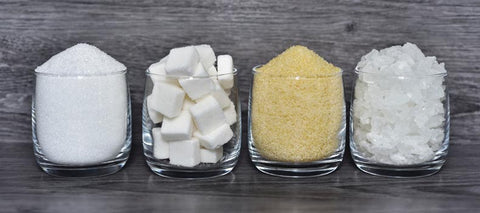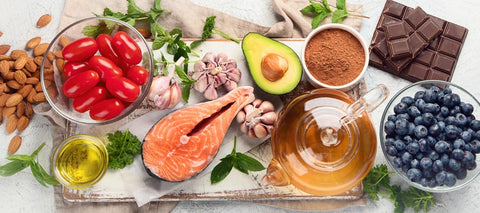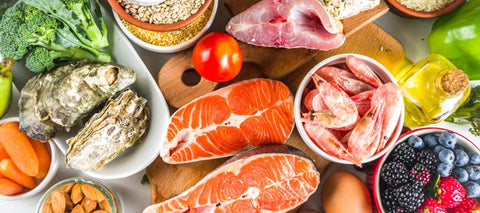This is a big mountain to climb – particularly as food labelling is rather a ‘vague issue’ even though there are constant moves to tighten the laws. Even if a clearly labelled product catches your eye, reading and understanding the nutrients contained is not so simple.
Manufacturers use clever (but not illegal) labelling in the most part, but it is the vagaries of this labelling that can catch you out – sugar is a particularly good example of this.
The jargon used on labels regarding sugar can be very confusing. Labels often contain the words ‘no added sugar’, or ‘unsweetened’. However, our brains will immediately think that these products are sugar-free and healthy to purchase. Unfortunately, this is not the case.
What should I expect with ‘no added sugar’?
This should not be confused with ‘no sugar’. Added sugar means no artificial or refined sugars are added to any product as an ingredient. They will, however, contain natural sugars, so you still must take that into consideration.
This doesn’t mean either that a product will not have any sweetness, or taste sour. Naturally occurring sugar should not harm us too much, but it still should be monitored, particularly if you have a sugar-related illness such as diabetes. Some fruits such as bananas, figs, grapes, watermelon, cherries and mangos have a high sugar content and should be limited. Other fruits such as oranges, strawberries, blackberries, peaches are relatively low in sugar, as are other citrus fruits such as grapefruits and limes. You should also be aware of products that have added milk. Milk contains lactose, which is considered as a type of sugar – it does, however, occur naturally – sugar is sugar at the end of the day!
Is ‘unsweetened’ the same thing?
Basically, yes. No sugars or sweeteners have been added to give it a sugary taste. But there will still be natural sugars contained within.
If you do love juice, try to learn to enjoy vegetable juices. Whilst many vegetables contain sugar, it is still comparatively low in content. Even better, chew down on a raw carrot!
I often hear the words ‘free sugar’ – what is it?
Free sugar is far from free when it comes to piling on the pounds by excess calorie intake. Free sugars are contained in many products that you would think are healthy and not high in sugar content. Drinking too much juice can cause potential problems in terms of illnesses such as Diabetes Type 2, and of course, obesity.
Fruit can be a big issue in this respect. When fruit is juiced, the sugars are released, and this classifies as ‘free sugar’. In items such as honey and syrup, these sugars are also considered free. The term ‘free’ is used simply because the sugar has escaped from its original cell and been released into the overall product by preparation. Natural fruits that you eat in their raw form don’t have this problem as the sugar remains intact in its cells, making the digestive system work to break down these cells. Added sugar is obviously a problem and is also discerned as a free sugar.
The other important fact about eating whole fruits as opposed to juices, is that the fibre content remains intact in the fruit, but not in the juices. If you consume several glasses of fruit juice per day, your sugar intake will be quite high, compared with one or two whole fruits.
To avoid any detrimental health effects, stick to limited amounts of fruit juice, vegetable juice or milk, and leave extra sugar in the sugar bowl! By all means have the odd treat of a small sweet snack from time to time, but do try to avoid sugar-laden jams, marmalades, spreads, biscuits and cakes.
As a guideline, a normal sized chocolate bar contains 25g free sugar, 150ml fruit juice contains 12g free sugar and a can of cola (take a breath here) has 35g free sugar. The UK Government recommends that no more than 5% of our daily calorie intake should be above this level (this equates to around 30g of free sugars per average adult). Children over the age of 11 should be regarded as an adult in the case of sugar intake.
The main concerns
Anyone suffering from diabetes or who is pre-diabetic, should really make every effort to cut down on any added sugars, and to avoid eating anything that will elevate blood sugar levels. There are lots of simple, low carbohydrate and/or low sugar foods that you can consume, which become even tastier with a touch of natural sweetness.
Both yoghurt and cottage cheese are good examples of being able to add fruit to or dip some carrot sticks into. Yoghurt should be plain, not flavoured, and preferably low-fat Greek yoghurt. Cottage cheese should not be flavoured (varieties often include items such as pineapple), but one containing herbs such as chives would be ok. Adding your own fresh, sliced strawberries to either of these will sweeten up your day, without harmful effects.
Next time you crave a sugar hit, stop and think. We have no dietary needs for added sugar, we can gain all the nutritional benefits from all the foods that are available to us in today’s world. Balance your diet and make the right choices, as well as reading labels on pre-packaged goods – it really is worth it.












